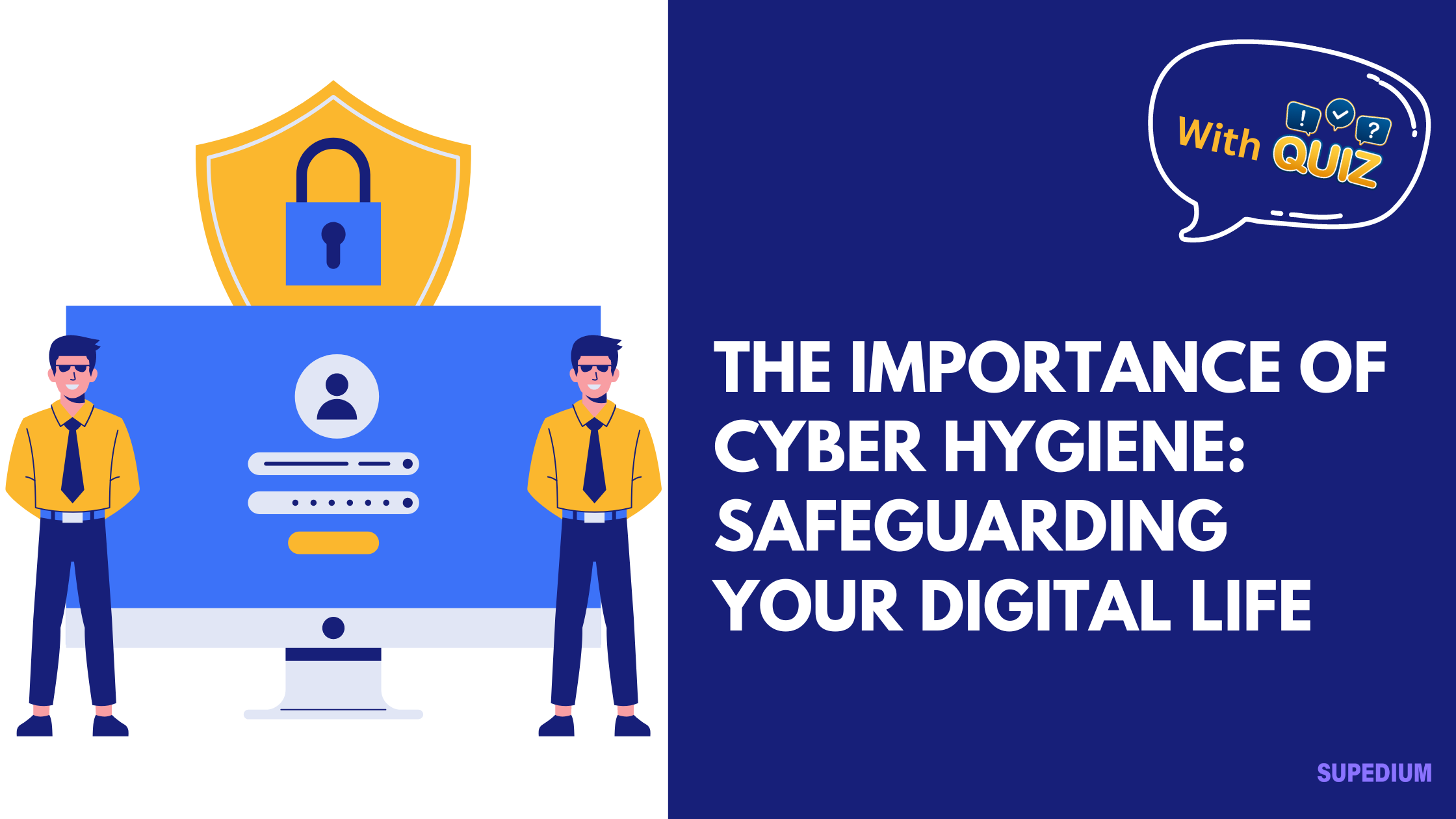Table of Contents
![]()
In an era where our lives are increasingly intertwined with digital technology, maintaining good cyber hygiene has become a crucial aspect of personal and organizational security. Just as regular handwashing and dental care are vital for physical health, proper cyber hygiene practices are essential for protecting our digital assets from threats and vulnerabilities.
Core Principles of Cyber Hygiene
Password Management
One of the fundamental principles of cyber hygiene is effective password management. Strong, unique passwords are the first line of defense against unauthorized access to your accounts. Passwords should be complex, incorporating a mix of letters, numbers, and symbols. Using a password manager can simplify this process by securely storing and generating passwords. Regular updates are also important; changing passwords periodically helps mitigate risks from potential breaches.
Software Updates and Patching
Keeping software updated is another critical aspect of cyber hygiene. Software developers frequently release updates and patches to fix security vulnerabilities that could be exploited by attackers. Automatic updates are convenient, but users should also manually check for updates to ensure that no critical patches are missed. Outdated software can become a significant security risk, as it may lack defenses against new types of malware and exploits.
Data Backup
Regular data backups are essential for mitigating the impact of data loss due to cyber incidents like ransomware attacks or hardware failures. There are various backup methods available, including local backups on external drives and cloud-based solutions. It’s important to schedule regular backups and periodically test data restorations to ensure that backups are functioning correctly and can be relied upon in an emergency.
Safe Browsing Practices
Safe browsing practices are vital for avoiding online threats. Users should be cautious when clicking on links or downloading attachments, especially from unknown sources. Reputable websites and secure connections (indicated by “https” in the URL) provide an added layer of protection. Adjusting browser security settings to block pop-ups and potentially harmful content can further enhance online safety.
Email Security
Email remains a common vector for cyberattacks, such as phishing scams and malware distribution. Recognizing suspicious emails and attachments is crucial for preventing these threats. Email filters and security features can help identify and block malicious content. Users should verify the authenticity of unexpected messages and avoid opening attachments or clicking links from unknown senders.
Device Security
Device security encompasses several practices designed to protect your hardware from cyber threats. Using firewalls and antivirus software helps defend against malicious attacks. Regular scans for malware and maintaining physical security (such as locking devices when not in use) are also important. These measures help ensure that devices remain secure and function properly.
Importance of Cyber Hygiene
Protection Against Cyber Threats
Good cyber hygiene is essential for defending against various cyber threats, including malware, ransomware, and identity theft. By adhering to recommended practices, individuals and organizations can significantly reduce their risk of falling victim to these attacks. Implementing robust security measures helps prevent unauthorized access and minimizes the potential damage from cyber incidents.
Preservation of Personal Privacy
Personal privacy is increasingly at risk in the digital age. Effective cyber hygiene practices safeguard sensitive information from unauthorized access and potential misuse. By securing personal data, individuals can protect their privacy and reduce the likelihood of identity theft and other forms of digital exploitation.
Business Continuity and Integrity
For businesses, cyber hygiene is crucial for maintaining operational continuity and protecting their reputation. Data breaches and cyberattacks can result in significant financial losses, legal consequences, and damage to customer trust. Implementing strong cyber hygiene practices helps ensure that business operations remain uninterrupted and that sensitive customer information is protected.
Legal and Regulatory Compliance
Compliance with data protection laws and regulations is another important aspect of cyber hygiene. Regulations such as the General Data Protection Regulation (GDPR) and the California Consumer Privacy Act (CCPA) impose strict requirements on how organizations handle personal data. Adhering to these regulations helps avoid legal penalties and demonstrates a commitment to data protection.
Implementing Cyber Hygiene Practices
Individual Actions
Individuals can enhance their cyber hygiene through education and awareness. Regularly updating passwords, performing software updates, and practicing safe browsing habits are essential personal responsibilities. Online resources and training programs can provide valuable information on best practices for maintaining cyber security.
Organizational Measures
Organizations play a critical role in promoting cyber hygiene among employees. Implementing comprehensive security policies, providing regular training, and enforcing best practices help create a secure working environment. Organizations should also invest in cybersecurity tools and infrastructure to protect against evolving threats.
Community and Public Awareness
Public awareness campaigns and community resources contribute to broader cybersecurity efforts. Collaboration between organizations, governments, and educational institutions can enhance public understanding of cyber hygiene and promote the adoption of effective security practices. Accessible resources and support can empower individuals and businesses to protect themselves against cyber threats.
Challenges and Solutions
Common Obstacles
Managing multiple accounts and keeping up with evolving security threats can be challenging. Additionally, resistance to change and complacency may hinder efforts to maintain good cyber hygiene. Overcoming these obstacles requires proactive strategies and ongoing engagement.
Strategies for Overcoming Challenges
To address these challenges, users can simplify security management through tools such as password managers and automated updates. Regular reminders and educational initiatives can help reinforce the importance of cyber hygiene and encourage consistent practice.
Future Trends and Developments
Emerging Technologies
Advancements in technology, such as artificial intelligence and machine learning, are shaping the future of cybersecurity. These technologies offer new capabilities for detecting and responding to threats but also introduce new challenges. Staying informed about emerging technologies and their implications for cyber hygiene is essential for adapting to the evolving landscape.
Anticipated Changes in Best Practices
As cyber threats continue to evolve, best practices for cyber hygiene will also adapt. Integrating new security technologies and strategies will be crucial for staying ahead of potential risks. Continuous learning and adaptation will help ensure that cyber hygiene practices remain effective in the face of emerging threats.
Conclusion
Maintaining good cyber hygiene is a vital aspect of safeguarding our digital lives. By following core principles such as effective password management, regular software updates, and safe browsing practices, individuals and organizations can protect themselves against cyber threats and ensure the security of their digital assets. As technology evolves, staying informed and proactive in cyber hygiene practices will be essential for continued protection and security.






Be the first to comment